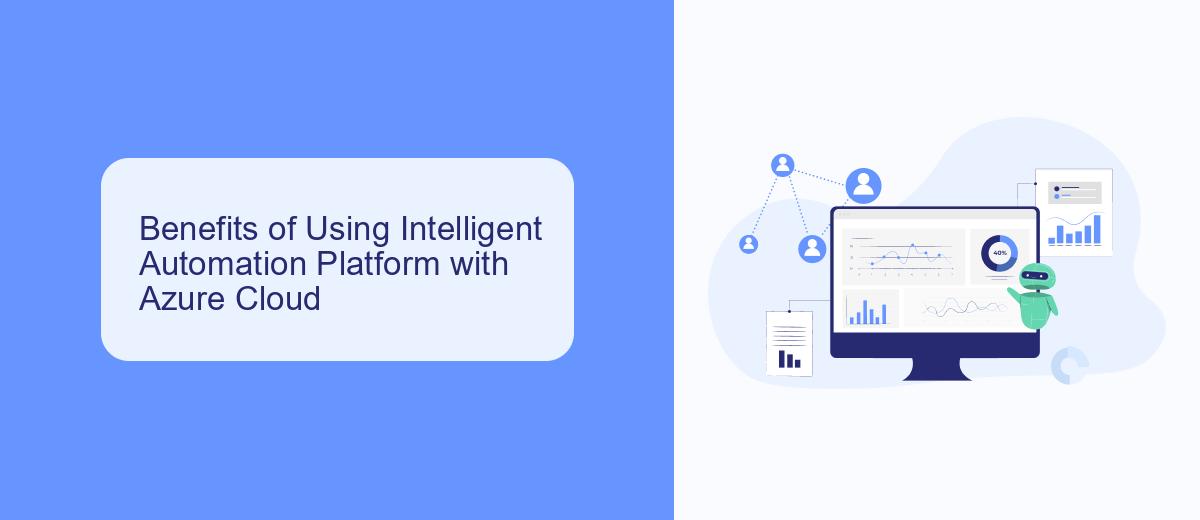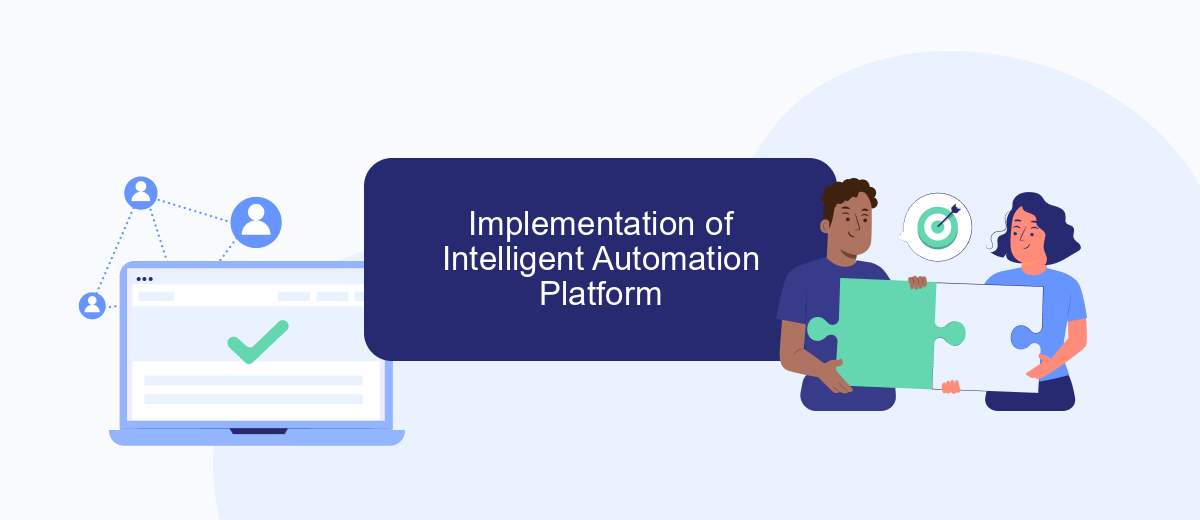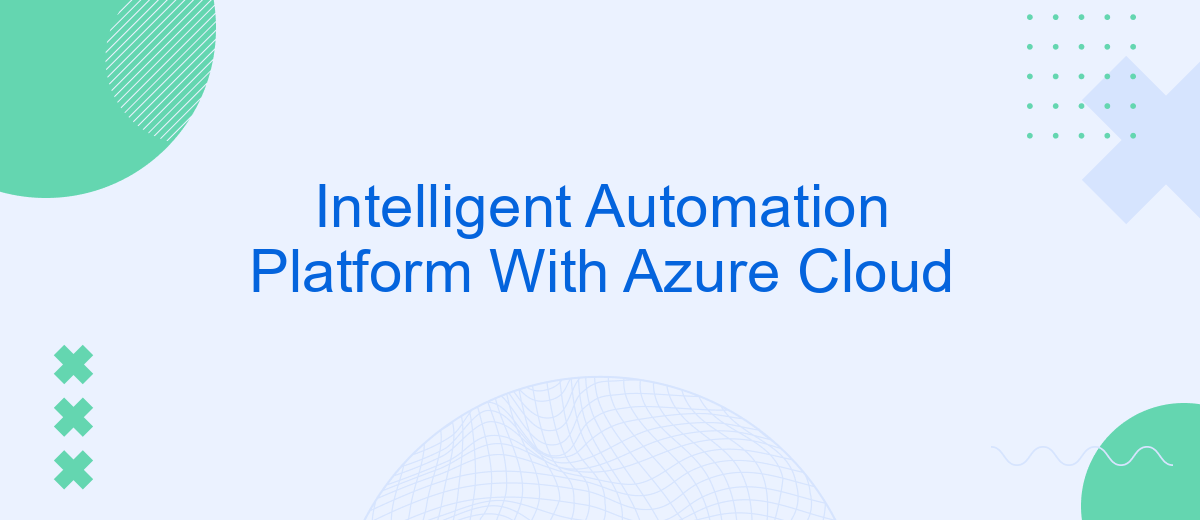In today's rapidly evolving digital landscape, businesses are increasingly turning to intelligent automation to streamline operations and enhance productivity. Leveraging the power of Azure Cloud, an Intelligent Automation Platform offers a robust solution for integrating advanced technologies like AI and machine learning. This platform empowers organizations to automate complex processes, reduce operational costs, and drive innovation, positioning them for success in a competitive market.
Introduction
In today's rapidly evolving digital landscape, businesses are increasingly seeking ways to enhance operational efficiency and drive innovation. Intelligent automation platforms, particularly those integrated with robust cloud services like Azure, are at the forefront of this transformation. These platforms leverage artificial intelligence, machine learning, and advanced data analytics to streamline processes, reduce costs, and improve decision-making. By harnessing the power of Azure's scalable and secure cloud environment, organizations can deploy intelligent automation solutions that are both flexible and resilient.
- Scalability: Azure's cloud infrastructure allows businesses to scale their automation efforts seamlessly.
- Security: Built-in security features ensure that data and processes are protected against threats.
- Integration: Azure provides extensive integration capabilities with existing systems and applications.
- Cost Efficiency: Pay-as-you-go pricing models help optimize expenditure on automation initiatives.
Adopting an intelligent automation platform with Azure Cloud not only enhances operational capabilities but also provides a competitive edge in the market. As organizations navigate the complexities of digital transformation, leveraging these advanced technologies becomes crucial for sustained growth and success. Through strategic implementation, businesses can achieve greater agility, improve customer experiences, and unlock new revenue streams.
Benefits of Using Intelligent Automation Platform with Azure Cloud

Leveraging an Intelligent Automation Platform with Azure Cloud offers a multitude of benefits for businesses seeking to optimize their operations. Azure provides a robust and scalable infrastructure that supports seamless integration with various automation tools, enhancing efficiency and reducing operational costs. By automating repetitive tasks and processes, companies can focus on strategic initiatives, thereby accelerating innovation and improving decision-making. The platform's advanced analytics and machine learning capabilities enable predictive insights, helping organizations anticipate market trends and customer needs, which leads to better service delivery and increased competitiveness.
Moreover, integrating services such as SaveMyLeads with Azure's Intelligent Automation Platform can streamline data management and enhance connectivity across different business applications. SaveMyLeads simplifies the process of automating lead data transfers between platforms, allowing for real-time updates and improved customer relationship management. This integration ensures that businesses can maintain a consistent flow of information, reducing the risk of data silos and enhancing overall productivity. Consequently, the synergy between Azure's cloud capabilities and intelligent automation tools empowers businesses to achieve greater agility and scalability in a rapidly evolving digital landscape.
Implementation of Intelligent Automation Platform

Implementing an Intelligent Automation Platform using Azure Cloud involves a structured approach to ensure seamless integration and operation. The platform leverages Azure's robust infrastructure to automate complex business processes, enhancing efficiency and reducing human error. By utilizing Azure's AI and machine learning capabilities, organizations can create intelligent workflows that adapt and learn over time, providing continuous optimization and improvement.
- Define the scope and objectives of the automation project, identifying key processes that will benefit from automation.
- Architect the solution using Azure services such as Azure Logic Apps, Azure Functions, and Azure AI to build scalable and resilient automation workflows.
- Develop and test automation scripts and models, ensuring they meet performance and reliability standards.
- Deploy the automation platform to Azure, utilizing Azure DevOps for continuous integration and deployment.
- Monitor and maintain the platform, using Azure Monitor and Azure Security Center to ensure ongoing performance and security.
By following these steps, organizations can effectively implement an Intelligent Automation Platform on Azure Cloud, driving digital transformation and achieving operational excellence. The flexibility and scalability of Azure allow for future expansion and adaptation, ensuring the platform remains aligned with evolving business needs.
Integration with Azure Cloud

Integrating an Intelligent Automation Platform with Azure Cloud offers numerous benefits, including scalability, flexibility, and enhanced security. Azure provides a robust infrastructure that supports seamless integration, enabling organizations to optimize their automation processes efficiently. By leveraging Azure's cloud services, businesses can enhance their operational capabilities and drive innovation.
The integration process involves connecting the automation platform with various Azure services such as Azure Functions, Azure Logic Apps, and Azure Machine Learning. These services allow for the creation of automated workflows, data analysis, and machine learning models, enhancing the platform's functionality. Azure's comprehensive suite of tools ensures that the integration is smooth and efficient, minimizing disruptions and maximizing productivity.
- Azure Functions: Enables serverless computing to run event-driven code without managing infrastructure.
- Azure Logic Apps: Facilitates the automation of workflows and business processes across different applications and services.
- Azure Machine Learning: Provides tools to build, train, and deploy machine learning models at scale.
By integrating with Azure Cloud, organizations can leverage cutting-edge technologies to streamline their operations. This integration not only enhances the capabilities of the Intelligent Automation Platform but also provides a scalable and secure environment for future growth. As a result, businesses can focus on innovation and delivering value to their customers.
- Automate the work with leads from the Facebook advertising account
- Empower with integrations and instant transfer of leads
- Don't spend money on developers or integrators
- Save time by automating routine tasks
Conclusion
In conclusion, the Intelligent Automation Platform with Azure Cloud offers a transformative approach to modern business operations. By leveraging Azure's robust infrastructure and AI capabilities, organizations can streamline processes, enhance efficiency, and drive innovation. The platform's scalability and flexibility make it an ideal choice for businesses looking to adapt quickly to changing market demands. As automation becomes increasingly integral to success, Azure provides the tools necessary to remain competitive while reducing operational costs and improving productivity.
Integrating various services and applications is crucial for maximizing the benefits of intelligent automation. Tools like SaveMyLeads facilitate seamless connectivity between platforms, enabling businesses to automate workflows without extensive technical expertise. By simplifying integration processes, SaveMyLeads empowers organizations to focus on strategic initiatives rather than technical challenges. As companies continue to embrace digital transformation, leveraging intelligent automation platforms and integration services will be key to achieving sustainable growth and maintaining a competitive edge in the digital age.
FAQ
What is Intelligent Automation Platform with Azure Cloud?
How does Intelligent Automation differ from traditional automation?
What are the benefits of using Azure for Intelligent Automation?
How can businesses integrate their existing systems with Azure for automation?
What are some common use cases for Intelligent Automation on Azure?
Use the SaveMyLeads service to improve the speed and quality of your Facebook lead processing. You do not need to regularly check the advertising account and download the CSV file. Get leads quickly and in a convenient format. Using the SML online connector, you can set up automatic transfer of leads from Facebook to various services: CRM systems, instant messengers, task managers, email services, etc. Automate the data transfer process, save time and improve customer service.

